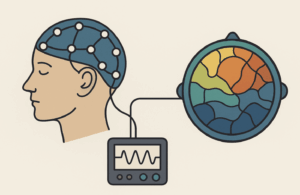Can ADHD Be Confirmed with Brain Waves?
A Closer Look at QEEG and ADHD Diagnosis
“Is there a test that can show I have ADHD? Can brain waves confirm it?”
This is a common question I get in clinic—especially from adults who’ve struggled with focus, restlessness, or impulsivity for years, but were never formally diagnosed.
The short answer: Yes, brain wave studies can offer important clues. But they don’t replace a thorough clinical assessment.
Let’s explore.
What Are Brain Waves, Really?
Our brains constantly produce electrical activity, which can be measured using electroencephalography (EEG). EEG captures different types of brain waves—like theta, beta, and alpha—each associated with different mental states.
In people with ADHD, studies often show a distinct pattern:
-
Increased slow-wave activity (especially theta)
-
Reduced fast-wave activity (like beta) in the frontal cortex
This leads to a high theta/beta ratio, often seen in kids and adults with inattentive symptoms.
What Is QEEG?
Quantitative EEG (QEEG) is a modern, computer-analyzed version of EEG. It maps brain activity using colour-coded brain maps and statistical comparisons to age-matched norms. This is sometimes referred to as “brain mapping.”
In ADHD:
-
Frontal underactivation is often observed
-
Imbalances in networks related to attention, inhibition, and motivation may show up
-
Some individuals may show “hotspots” of overactivation in sensory areas
QEEG doesn’t “diagnose” ADHD by itself, but it provides objective biomarkers that complement clinical evaluation.
Why This Matters
-
Clarity: Especially for borderline or complex cases (e.g., anxiety mimicking ADHD), QEEG adds a layer of confidence.
-
Tailored Interventions: QEEG findings can guide neurofeedback, cognitive training, or even medication choices.
-
Non-invasive and Safe: No radiation, no sedation—just electrodes on the scalp and a relaxed mind.
So, Should You Get a Brain Wave Test?
Not everyone needs it. But if you:
-
Have symptoms of ADHD but aren’t sure
-
Want a second opinion or objective data
-
Are exploring non-medication options like neurofeedback
…then a QEEG could be worth discussing.
At Mind & Memory Lab, Chennai
At my clinic, we integrate clinical interviews, psychometric testing, and QEEG brain mapping as part of a comprehensive ADHD workup.
👉 Services offered:
-
Adult & child ADHD evaluation
-
QEEG-based brain mapping
-
Cognitive remediation & therapy options
-
Online consultation and digital reports
Final Thoughts
ADHD isn’t just a “behavioral problem.” It’s a neurodevelopmental condition—and modern tools like QEEG are helping us see the brain behind the behavior. If you or your child have long-standing focus or impulsivity concerns, don’t wait. Diagnosis is the first step to healing and thriving.
Dr. Srinivas Rajkumar T
Consultant Psychiatrist
Apollo Clinics Velachery & Tambaram
Website: www.srinivasaiims.com
📞 For appointments: 85951 55808
